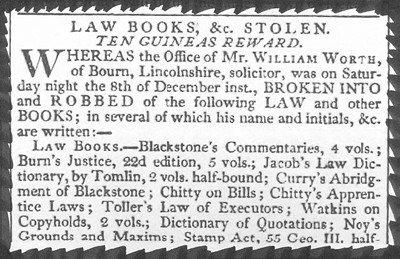|
The strange case of the stolen books
One of the most curious crimes in the history of Bourne was the theft of a large quantity of books from premises in North Street 200 years ago. Shortly before Christmas 1821, thieves broke into the offices occupied by William Worth for his practice as an attorney at law or solicitor. Their haul included a collection of 100 volumes mostly dealing with legal practice although many others also came from his private library. There was no police force or detectives in those days and the apprehension of criminals was left to constables who were reluctant to leave their own parish or to members of the public who were encouraged by the prospect of a reward. Worth consequently inserted a public notice in the Stamford Mercury offering ten guineas for information leading to the capture of those responsible although when reporting the theft on December 14th the newspaper speculated that “it is supposed that they proceeded to London with their booty". He therefore widened his appeal by adding to his notice: "All booksellers, pawnbrokers and others are requested, in case of the said books, or any of them, shall be offered for sale or otherwise, to give these details to Mr Worth or his London solicitor by whom the reward will be paid on conviction of any one or more of the offenders." Books in those days were extremely valuable, particularly as many of these were handsomely bound in leather and embossed with gilt lettering and several had Worth’s name or initials engraved on the front. They dealt with a variety of topics mainly relating to legal procedures which were invaluable in the running of his law practice including wills, the payment of bills, patents, court procedures, mortgages, auctions, annuities, bankruptcy, and conveyancing, together with a quantity of other books from his personal library on subjects such as poetry, quotations, local history, geography, travel and theology. But few people could read at that time and as these volumes were what was known as learned tomes and dealt mainly with the law, the re-sale value was restricted and as the theft had been publicised their provenance would have been known. There was also the question of transport because the haul was a heavy one and a wagon or carriage would have been needed to move them once they had been stolen while the cost of getting them to London by stagecoach or carrier’s cart would have been prohibitive and liable to the speedy exposure of the stolen goods and ultimately the thieves. The reasons behind the theft, therefore, remain a mystery. What we do know is that William Worth was always short of money and was beset by many personal problems at this time. He was born at Horbling in 1789 and had begun his legal career as an articled clerk with a local firm of solicitors where his father worked and when he died in 1812, he succeeded him as a junior partner to Benjamin Smith. But the relationship with his senior colleague became strained because of his conduct and in 1813 he became extremely drunk while attending Folkingham fair when he lost all of his money and somehow ended up in Edinburgh from where he was rescued by his brother Henry who brought him back to be reinstated with the firm. But his drinking continued and in 1817 the partnership was eventually dissolved. The two settled, Worth remaining with the firm but simply as a clerk. They did work together for a further year, apparently without any major disruption, until mid-November 1818 when Worth expressed a desire to leave Horbling and Smith recorded in his diary: "I wish he was gone." Worth sold up his house in the village and moved to Bourne with his wife, a local girl, Mary Ann Quincy, who he had married in 1816, and set up home in a grand three storey property which he built in North Street in 1821 on the site of the old Waggon and horses public house, now known as Wake House. The couple had five children, William (1819), Harriet (1821), Sarah (1824) and Charles (1824) who died in infancy followed by another son, Charles Frederick, who was born on 13th October 1825 when the couple followed the practice that was usual at the time of giving him the same name and he was destined to become the Charles Worth of fashion history. William Worth is mentioned as the legal adviser in many of the land and property transactions taking place in Bourne at that time but his extravagant lifestyle continued and despite matrimony, he did not mend his ways. As the drinking, gambling and bad investments continued, the debts piled up and his extravagance and wayward conduct eventually drove him into bankruptcy and he finally deserted his wife and children in 1836 after his affairs collapsed, leaving them homeless and destitute. In desperation, Mrs Worth sought help from wealthy relatives living at Billingborough who employed her as a housekeeper. Worth left the town and went to live in London for a spell but his impoverishment had cost him his house which he had been forced to sell. Ironically, his son Charles Worth, who had been born there, had left to start work in London and then Paris where he forged an illustrious career in international fashion and a happy family life. When he died in 1895, he had become one of the richest men in France, awarded the country's highest accolade, the Legion of Honour, and the president of the republic was among the 2,000 people who attended his funeral. William Worth came back to Lincolnshire and lived for a while at Horbling where he again practised as a solicitor but he eventually retired and moved to Billingborough where he died on 12th November 1878, aged 89, but there is no record of his books ever being recovered.
Go to: Main Index Villages Index |
